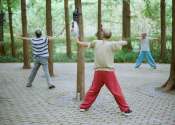Shorter time in bed may protect against chronic insomnia
Twenty to 50 percent of Americans suffer from acute insomnia each year, defined as difficulty falling asleep or staying asleep, three or more nights per week, for between two weeks and three months. Roughly 10 percent of ...
Jun 13, 2016
0
16



